Episodes

Friday Nov 20, 2020
The Green Homes Grant
Friday Nov 20, 2020
Friday Nov 20, 2020
A new Government scheme has launched called the Green Homes Grant which will help homeowners in England improve the energy efficiency of their properties via a £5,000 grant. The grant can be used for a whole range of energy saving improvements including double-glazing, loft insulation, solid wall insulation and floor insulation.
Improving the thermal efficiency of the envelope of the property (floor, walls and roof) in our opinion is the best way to help lower homeowner’s energy bills and also reach the Governments ambitious energy targets.
In total, the Chancellor Rishi Sunak has put aside £2 billion for the Green Homes Grant scheme, meaning a minimum of 400,000 homeowners in England should benefit.
It is expected that everyone will be able to apply for this grant – it will not be means tested.
The Scheme is due to run until the end of March 2021.
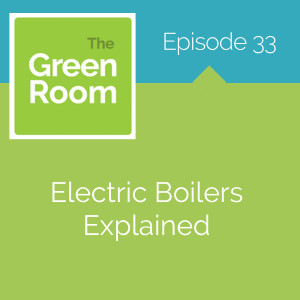
Friday Feb 28, 2020
Electric Boilers Explained
Friday Feb 28, 2020
Friday Feb 28, 2020
What happens when you put two energy experts in a room and ask them about electric boilers? We’re answering all your burning electric boiler questions. Are gas boilers still legal? Are electric boilers better for the environment? Is an electric boiler more expensive than gas? Should I swap my central heating for an electric boiler?
_________________________________________________________________________________________________
HOW DO ELECTRIC BOILERS DIFFER FROM GAS ONES?
The short answer to this is that they use different methods of heating water.
A gas boiler takes in gas from the national network supply and burns it to produce heat. This then goes through a heat exchanger, which heats the water used for both your central heating and hot water. With an electric boiler, it’s a similar process but instead of burning natural gas to create heat, an electric boiler heats the water using power directly from an electricity source (almost always the national grid). It works a lot like a kettle.
This means that electric boilers are actually significantly more efficient than their gas counterparts. Modern gas boilers can reach as high as 95% efficiency (or even higher), but electric boilers can reach 100% efficiency.
However there are a lot of issues with electric boilers that don’t come up with gas boilers. In this podcast, we explain the benefits and drawback or electric boilers, and discuss the governments move towards this type of water and space heating.
_________________________________________________________________________________________________
Read More:
The Green Age: Electric Boilers - https://www.thegreenage.co.uk/tech/electric-boilers/
The Best Electric Boilers 2020 - https://www.boilerguide.co.uk/articles/best-electric-boilers
Gas boilers could be banned from all homes by 2050 - https://www.telegraph.co.uk/politics/2020/02/08/homeowners-could-forced-replace-gas-boilers-ensure-uk-meets/
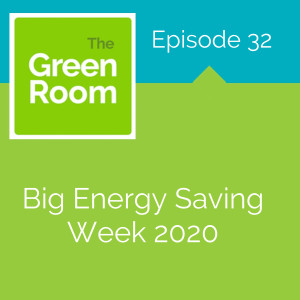
Wednesday Jan 22, 2020
Big Energy Saving Week 2020
Wednesday Jan 22, 2020
Wednesday Jan 22, 2020
The Green Room: What happens when you put two energy experts in a room and ask them about Big Energy Saving Week 2020? We’re digging deep into one of energy’s biggest events of the year this episode, and giving our own take on the top tips that BESW20 published in aid of the event. From tariff switching to taps, we’re taking a closer look at which energy saving measures really do work.
_________________________________________________________________________________________________
WHAT IS BIG ENERGY SAVING WEEK 2020?
Big Energy Saving Week is a national campaign to help people cut their energy bills and get all the financial support they are entitled to. This year it is running between 20th-27th January, and you can get involved on social media using the hashtag #BEST20.
WHO IS BIG ENERGY SAVING WEEK TARGETING?
Everybody! BESW20 is al about getting people aware of their energy use and thinking about their habits. This year, there is a special focus of 4 major groups: people using electric heating, people in debt to their energy suppliers, people with hard-to-heat homes, and anyone that doesn’t have full access to the internet. These are the groups reckoned to be in the most need of energy saving and general energy advice, but really BESW20 is for everyone.
WHAT IS HAPPENING DURING BIG ENERGY SAVING WEEK 2020?
There’s plenty going on this week to get involved with! Citizens Advice are holding events around the country for people to go and get free energy saving advice. There are also plenty of resources that have been produced, including lectures, social media, and a whole lot of content. Don’t forget to use the #BESW20 hashtag to be part of the conversation!
_________________________________________________________________________________________________
Read More:
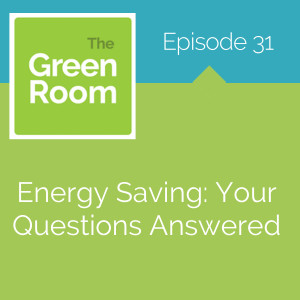
Thursday Jan 16, 2020
Energy Saving: Your Questions Answered
Thursday Jan 16, 2020
Thursday Jan 16, 2020
What happens when you put two energy experts in a room and ask them your questions about bills, energy, and the environment? We’re back for 2020 and we’re answering all the questions you asked while we were away. We cover insulation, triple glazing, the DECC, and celebrate the 2019 energy mix. If you have questions about energy saving, we have the answers.
_________________________________________________________________________________________________
WHAT IS DECC?
DECC is the Department of Energy & Climate Change, a now defunct department of the British government. Controversially, DECC was scrapped and became part of Department for Business, Energy & Industrial Strategy in July 2016. We’re wondering if it’s likely to come back any time soon.
WHAT IS TRIPLE GLAZING?
Put simply, triple glazing is 3 panes of glass instead of 1 or 2. The claim is that by having an extra pane, you will increase efficiency and reduce noise. We already know that double glazing makes a significant improvement over single glazing, but even so, upgrading from single to double glazing takes a long time to pay back in terms of energy efficiency. So would making the jump to triple glazing make that much of a difference?
WHAT IS A U-VALUE?
The U-value signifies the heat lost through a given thickness of a particular material. You don’t really need to understand the mechanics of how it is calculated; instead it is useful to be able to compare different substances by their U-values. The lower the U-value is, the better the material is as a heat insulator.
WHAT IS THE UK’S ENERGY MIX?
We haven’t had the full figures released yet for the last quarter of the year, but the first part of 2019 saw a significant shift towards renewbles, providing 38.9% of our electricity. Nuclear provided 18.4%, gas 38.8%, oil 2.9%, and coal 1%.
_________________________________________________________________________________________________
Read More:
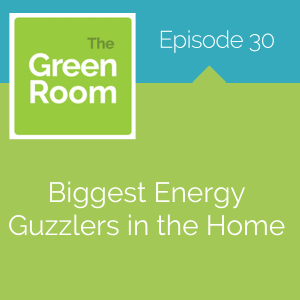
Wednesday Dec 11, 2019
Biggest Energy Guzzlers in the Home
Wednesday Dec 11, 2019
Wednesday Dec 11, 2019
What happens when you put two energy experts in a room and ask them what is causing your energy bills? We’re looking at energy guzzlers today, aka energy vampires. It’s all about appliances this week, and how much energy they use. We cover heating, washing, and more. There is also a significant amount of discussion about tea.
_________________________________________________________________________________________________
SOME TOP TIPS TO SAVE ENERGY
- Familiarise yourself with your heating controls! A bit of fiddling can make a big difference to your bills. Dropping your thermostat by just one degree should save £60 over the course of a year.
- Switch to efficient LED lighting. In halogen bulbs, 90% of the electricity used is given off as heat, and only 10% as light. With LEDs, this figure is reversed, making them far more efficient.
- Heating hot water is an expensive business, so try to limit your usage.
- Avoid electric convection heating – electricity costs 4x as much as gas. If your property is off-gas, you have other options. Infrared, for example, is powerful and efficient.
- Don’t wash your clothes at unnecessarily high temperatures. A 40°C wash uses a third less energy than a 60°C cycle. Also, be sure to fill up your washing machine every time you use it.
_________________________________________________________________________________________________
Read More:
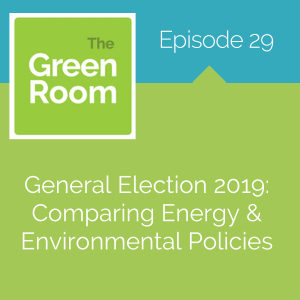
Thursday Dec 05, 2019
General Election 2019: Comparing Energy & Environment Policies
Thursday Dec 05, 2019
Thursday Dec 05, 2019
The Green Room: What happens when you put two energy experts in a room and ask them about the upcoming UK general election. James, Nick and Harri are today discussing the political agendas of all the main political parties, and getting to the bottom of what we’re being promised. How soon can we be carbon neutral? How many trees should we be planting? How much should we be investing on improving the energy efficiency of our buildings?
_________________________________________________________________________________________________
WHAT ARE THE BIG ENERGY AND ENVIRONMENT ISSUES FACING US IN THE 2019 UK GENERAL ELECTION?
Cutting emissions
All the main parties want the UK to move toward being carbon neutral, but they have very different timelines on when they think we can achieve this.
Improving UK housing stock
A huge number of buildings in the UK are woefully underinsulated, making them very inefficient with energy. Politicians are aiming to tackle this in many different ways, with wildly different levels of priority and expenditure, and significantly different focuses.
Transportation
Whether it’s investing more in cycle lanes and buses, or ending the sale of petrol and diesel car in favour of electric vehicles, the future of the British transportation and how it affects the environment is a policy for all the parties.
Renewable energy
There’s a lot of variation between the party positions here, including policies on nuclear power, wind farms, fracking, and more. Where does our energy come from and what should we be investing in?
_________________________________________________________________________________________________
Read the Party Manifestos:
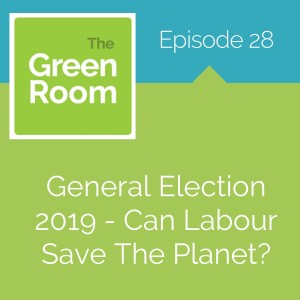
Friday Nov 08, 2019
General Election 2019 - Can Labour Save The Planet?
Friday Nov 08, 2019
Friday Nov 08, 2019
What happens when you put two energy experts in a room and ask them about Labour’s proposed energy policy? We’re getting into election fever this week, talking through the newly announced energy policies of the Jeremy Corbyn and the Labour party. What is the ‘Warm Homes For All’ plan, and will it work? Is it just another Green Deal?
Subscribe:
Itunes - https://itunes.apple.com/gb/podcast/the-green-room-by-the-greenage/id1450172106
Spotify - https://open.spotify.com/show/0mrSwzL4dKtNhm90fUEo63
Sticher - https://www.stitcher.com/podcast/greenage/the-green-room-by-the-greenage
Podbean - https://thegreenage.podbean.com/
_________________________________________________________________________________________________
By 2030, Labour plans to:
- Cut carbon emissions by 10% – the equivalent of 72% of the emissions of all the cars in the UK.
- Prevent 1,500 deaths from cold and up to 560,000 cases of asthma due to reduced damp.
- Bring energy bills of 9.6 million low income households down by an average of £417 per year.
- Eradicate the vast majority of fuel poverty by the mid-2020s, benefiting the 1.14 million elderly people and one quarter of single parents currently living in fuel poverty.
- Create an estimated 250,000 skilled jobs in the construction industry like insulation specialists, plasterers, carpenters, electricians, gas engineers, builders and window fitters – with the quality of work and rights at work guaranteed. The investment will generate another 200,000 jobs across the economy.
_________________________________________________________________________________________________
Read more:
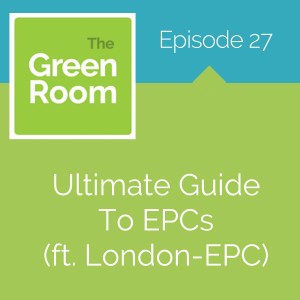
Wednesday Oct 23, 2019
Ultimate Guide To EPCs (ft. London-EPC)
Wednesday Oct 23, 2019
Wednesday Oct 23, 2019
What happens when you put not two, but three energy experts in a room and ask them all about energy performance certificates? Today’s episode is a full A to Z of EPC, most domestic and commercial. We have special guest Alan Bouquet in the studio today from London-EPC, answering all our EPC questions. There’s also a tangent about nuclear power, and James wears another neon polo shirt.
_________________________________________________________________________________________________
Energy Performance Certificates were introduced by the government back in 2007 for both domestic and commercial properties. They are designed to give a reflection of the energy efficiency of a building, based on various factors such as the insulation present, heating systems, glazing and any renewables.
WHAT DOES AN EPC INVOLVE?
A qualified energy assessor will need to come and visit a property to produce an EPC, taking measurements and photos. The assessor will then put the information into a software package, which creates the EPC document. The EPC is ‘lodged’ onto a government EPC register, where you can find any property in the UK.
WHEN DO YOU NEED AN EPC?
The EPC is required when you are selling a property, or when you are letting it. It can also be requested for various government schemes, and from institutions like banks when applying for a mortgage.
_________________________________________________________________________________________________
Read more:

Wednesday Oct 02, 2019
What Is The Cheapest Way To Heat My House?
Wednesday Oct 02, 2019
Wednesday Oct 02, 2019
The Green Room: What happens when you put two energy experts in a room and ask them what the cheapest way is to heat your homes? With the cold approaching fast, we’ve put together a guide to the cheapest heating systems around. We’re judging these heatings systems on install and running costs, as well as looking at their environmental impact.
Related Episodes
Episode 25: Boilers 101
Episode 4: What's the Cheapest Electric Heating?
Subscribe:
Itunes
Spotify
Sticher
Podbean
_________________________________________________________________________________________________
WET CENTRAL HEATING SYSTEMS
By far the most common form of heating in the UK is a wet system, using a boiler and radiators. The boilers come in many different types, but almost all of them work on the same principle of burning gas/oil/wood to heat water, which is then fed through pipework into radiators and/or underfloor heating systems around your home.
ELECTRIC HEATING SYSTEMS
Just like wet systems, electric heating uses conduction for transfer heat from one source to another. However, electric heating systems rarely use water to fill radiators, and tend to instead use electricity to directly power heating element and warm the room that way. All electric heating systems are slightly different, and there’s a lot of debate about which is the cheapest way to heat a home, so we’ve gone through them all here. That includes more alternative forms of electric heating, such as heat pumps, and infrared heating.
_________________________________________________________________________________________________
Read more:
A Beginners Guide to Boilers
What Kind of Boiler Do I Have? -
Should I replace my conventional boiler with a combi?
What is the Cheapest Electric Heater to Run?
Gas Distribution Network

Wednesday Oct 02, 2019
Boilers 101: How To Heat Your Home
Wednesday Oct 02, 2019
Wednesday Oct 02, 2019
What happens when you put two energy experts in a room and ask them all about boilers and home heating? We’re looking forward to winter this week, and that means we’re talking all things central heating. In this episode we demystify boilers, taking you through each different type of boiler, along with their pros and cons. Scroll down for a simple summary of boilers and hot water systems.
_________________________________________________________________________________________________
COMBI BOILER
Usually the boiler of choice for flats or small houses with only one bathroom, since it doesn't require a hot water tank. If you have a small property, it's an incredibly convenient boiler system, but won't work for larger families.
SYSTEM BOILER
System boilers use a hot water tank in an airing cupboard to store hot water. As a sealed, pressurised system, these boilers can provide hot water to several outlets at the same time, operating at the same water pressure as your mains flow..
CONVENTIONAL BOILER
Also known as regular boilers, traditional boilers, or open vent boilers. These use a dual tank gravity system to create the water pressure. You can use multiple outlets at once, but they take up a lot of space and are limited by the positioning of the tanks.
OTHER HOT WATER SYSTEMS
Back Boiler: A type of conventional boiler but with a gas space heater fire at the back. They're no longer available in the UK due to inefficiency.
Biomass Boiler: Instead of using gas to produce the heat, biomass boilers combust sustainable wood pellets. They also qualify for the RHI government funding scheme.
Oil/LPG Boiler: Work the same as normal boilers, but fuel used is stored on site rather than coming off ‘the grid’. Fairly reliable, but relatively expensive and very bad for the environment.
Electric Boiler: An electric boiler can be used in off-grid areas, or where a gas supply is either not wanted or not possible. However, they are very expensive to run.
Combined Heat and Power (CHP) Boiler: Acts as micro power plants by providing your hot water, but also using the wasted energy to generate electricity to use around the home.
Instantaneous Hot Water Points: They work the same way as electric showers, heating the water at the point of use. Only really used in outhouses or garden sheds, etc.
_________________________________________________________________________________________________
Read more:
An Introduction to Gas Boilers
What Kind of Boiler Do I Have?

